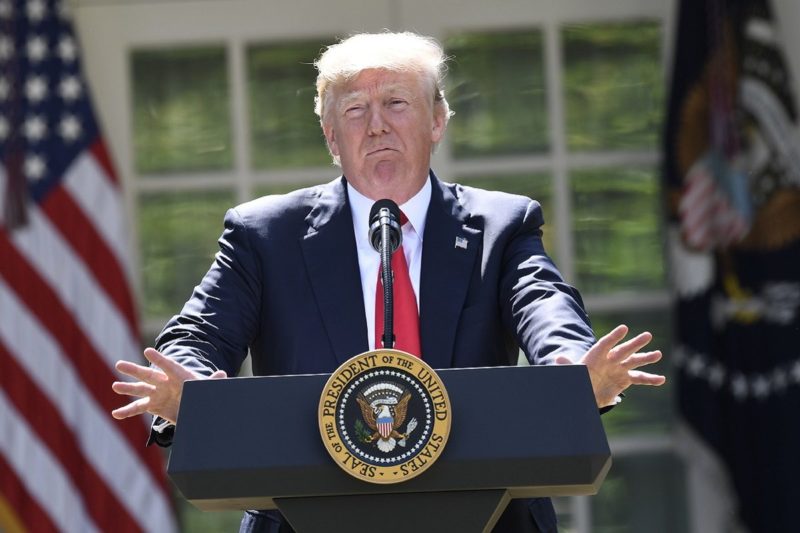Did Trump’s Anti-Trans Tweets Come From Far-Right Memo?
A group of ultra-conservative leaders signed a memo arguing why the Defense Department should no longer permit transgender people to serve in the military.

President Donald Trump’s Wednesday morning tweets announcing his plan to ban transgender people from serving in the U.S. military appeared to take his own Joint Chiefs of Staff by complete surprise, while those likely in the know belong to a collective of far-right leaders.
Evidence is emerging that leaders of the country’s Christian far-right movement inspired the tweet-nouncement before the president put fingers to phone.
On May 16, about 100 people—among them Christian-right movement leaders, retired generals, President Ronald Reagan’s staff members, and former U.S. House members—signed a memo arguing why the Defense Department should no longer permit transgender people to serve in the military.
This “Memo for the Movement,” reported by Axios, was authored by the Conservative Action Project (CAP), a little-known coalition of far-right groups that has included among its influential members White House counselor Kellyanne Conway, according to the Washington Post. The wording of Trump’s Wednesday tweets echoes the overarching argument in this memo, titled “Restoring America’s Military Strength: Military Readiness or Transgender Politics.” (The memo Axios links to has slightly fewer signatures than the memo on CAP’s website.)
Though many of its signers represent religious-right groups like the Family Research Council and the Eagle Forum, the memo mostly avoids religious argument and instead asserts that allowing trans people to serve threatens military readiness, which is exactly what Trump argued on Twitter.
“Our military must be focused on decisive and overwhelming victory and cannot be burdened with the tremendous medical costs and disruption that transgender in the military would entail,” Trump tweeted.
Likewise, the CAP memo argues that the Obama-era policy permitting transgender people to serve openly in the military impedes “mission readiness, Command proficiency, and combat effectiveness.” The memo discusses the medical costs the Department of Defense will have to bear while employing service members who are transgender, including for hormone therapy, sexual reassignment surgery, and psychological therapy.
Despite what Trump refers to as “tremendous medical costs,” a 2016 Rand Corporation study of the implications of allowing transgender people to serve openly found that transition-related treatment would bump up military health-care spending by between $2.4 million to $8.4 million annually, overall representing up to only 0.134 percent of annual military health-care costs.
The CAP memo invokes religion once, arguing that there is no justification to mandate military medical doctors and nurses to provide and participate in “life-altering transgender treatment or surgeries,” given that “[m]any object to these experimental treatments on grounds of medical ethics or sincere religious convictions.”
Politico reported that Trump’s tweets are the result of a deal he made with House Republicans: He reportedly traded the rights of transgender people to serve in the military in exchange for legislation funding his promised wall on the border of Mexico and the United States.
“[A] behind-the-scenes GOP brawl threatening to tank a Pentagon funding increase and wall construction hastened Trump’s decision,” Politico reported.
Politico, which alluded to the May memo, noted that Defense Secretary James Mattis had refused to immediately upend the military’s policy regarding transgender service members, something the CAP memo notes.
Despite Trump’s tweets, the White House has not yet issued an official order reversing the military’s transgender policy, and such legislation has yet to be introduced in Congress. General Joseph Dunford, chairman of the Joint Chiefs of Staff, announced that no changes will be made until the president releases an explicit directive, Reuters reported.
Exactly who prompted Trump to tweet his controversial policy plans that were unknown to many in his administration remains a Washington mystery. Axios and Politico are reporting that, internally, White House staff like Chief Strategist Steve Bannon and Director of Legislative Affairs Marc Short, a former Koch brothers operative, have lobbied Trump to reverse the military policy, in addition to the House’s far-right wing.
Among the CAP memo signers was Tony Perkins, who heads the Family Research Council (FRC) and the Council for National Policy (CNP), the umbrella organization for CAP. FRC has been identified by the Southern Poverty Law Center as an LGBTQ hate group.
Around the same time of the memo’s release, House Majority Whip Steve Scalise (R-LA)—who was discharged from the hospital this week after a gunman targeting Republicans shot him at a congressional baseball practice in June—addressed a CNP meeting and noted he has been “working very closely with Tony Perkins” on a host of issues. During his tenure in Congress, Scalise has opposed marriage equality, as well as gay military service members serving openly.
Reagan-era Attorney General Edwin Meese III founded CAP in 2008, according to the organization’s website. CNP’s most recently available tax filing lists CAP as a program designed “to facilitate leaders working together on behalf of common goals.” The council has a reputation for being secretive and powerful.

